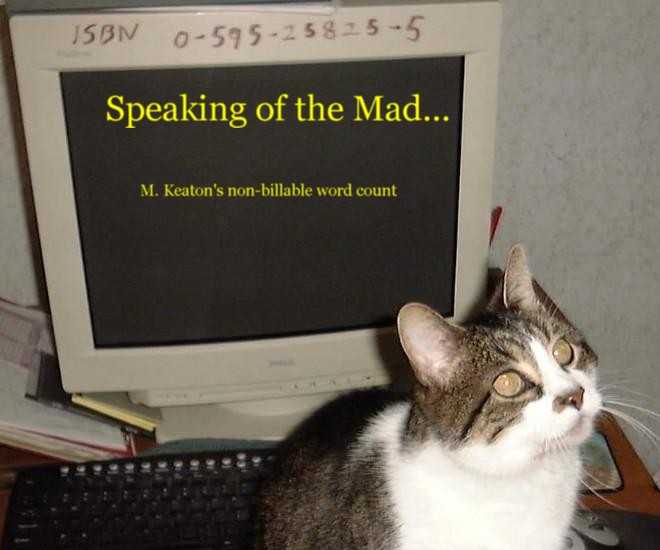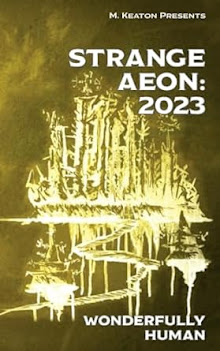The Thin Man was complaining (again) about the blog so I tried to explain to him that we weren't blogging right. It seems to me that the point of a weblog is to communicate to your readers that you're a real, approachable human being--basically to show that he's a nice guy. The problem is, he ain't. And a blog is supposed to be about opinions and interests outside of just being a writer. Here again, the problem is, he ain't--interested is much outside of writing, that is. Actually, he has numerous other interests (I mean, ever seen his business card? How many wierd jobs can one guy hold? And that's not even counting a decade in the laboratory.) but that, in the end, every one of those interests feeds back into writing. I say "Talk about being a scientist" and he replies, "It helps me write sci-fi better." I say "Talk about farming" and he says, "Helps me remember there's more to a good description than just the visual." And round and round we go. Part of it is his difficult nature but, at the heart of it, it's true. For all practical intents and purposed, the Thin Man exists for the craft.
Well, I'm working on getting more interesting stuff out of him than just lectures and book reviews (and by all means give me ideas and ask questions) but, for now I guess I'll just let him keep on talking about writing. Specifically, I asked him to talk about what it's like to make a living writing. The answer...
But what I want to know is: what are the answers to his questions?
"It is popular to complain about the difficulties of being an
author and of making a living by writing. It is also popular to complain
about the difficulties in getting published and how it is increasingly
difficult to succeed.
Writing is not about doing what is popular.
To write, one must accept that it is a labor, not a hobby, and therefore, as
with all work, there is difficulty. The great "secret" is no more than
that: to write is to labor.
There is nothing new under the sun. The old ways were no
easier.
***
After review by three hundred men, upon the testimony of twelve
true men of country and aristocracy, upon the word of a magistrate-all of
which shall attest on conscience that the aspirant has the qualities and
attainments requisite for the struggle-and after demonstrating proficiency
in the Four and Twenty Games, the aspirant shall be subjected to oral
examination. Should his answers suffice, then the aspirant shall be deemed
worthy to begin his study of the craft. The questions are as follows:
a.. Who existed before darkness or light?
b.. Where are the roots of the world?
c.. On what day was Adam created?
d.. Whence comes night and day? Why is the eagle grey? Night dark?
Linnet green? Why does the sea swell? And, Why is this not known?
e.. What are the three fountains on the mountain of skill?
f.. What is the best deed man has performed?
g.. Who will measure Death? Who can tell the thickness of its veil? The
size of its maw? The value of its stones?
h.. Why do the treetops bend and bow? What were the words before words?
i.. Whence comes darkness when the day ends? Where does it go when day
dawns?
j.. What makes man a slave?
k.. Canst thou guide and judge?
l.. Will you sow and labor?
This shall be the minimum requirement.
(Paraphrased from The Four Welsh Texts)
***
That was then; this is now. The requirements have not,
essentially, changed in two millennia."
Saturday, November 22, 2008
Subscribe to:
Post Comments (Atom)





















No comments:
Post a Comment